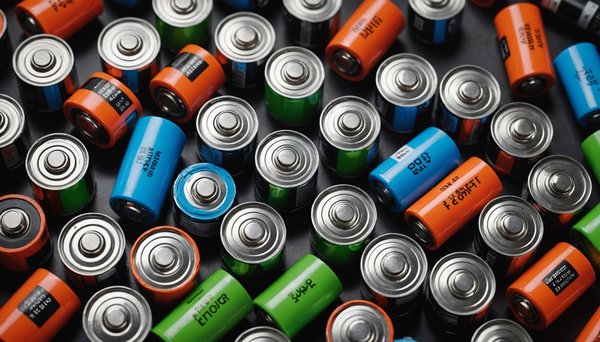Sustainable lithium batteries are transforming how we power our devices and vehicles. With options that cater to various needs, from everyday electronics to off-grid solutions, it's crucial to understand their benefits and safety aspects. This guide explores the latest advancements, purchasing tips, and eco-friendly practices that empower you to make informed choices. Discover the sustainable options that align with your lifestyle and contribute positively to the environment.
Introduction to Lithium Batteries
Understanding lithium battery technology is essential as it plays a pivotal role in powering today's diverse electronic landscape. From portable gadgets to electric vehicles, these batteries offer substantial advantages over traditional technologies. Key benefits include higher energy density, which allows for longer usage between charges, and lighter weight, making devices more portable. Additionally, their capability to deliver stable power is essential in maintaining the reliability of devices.
There are numerous types of lithium batteries, each designed for specific applications. Common formats include lithium-ion and lithium-polymer batteries, with distinctions often based on performance and form factor. For instance, lithium-ion is favored in consumer electronics due to its energy density, while polymer variants are popular in devices requiring flexible form factors.
Safety is an ongoing concern with lithium batteries, particularly given incidents of overheating or fire. Solutions include enhanced engineering such as fail-safes and Battery Management Systems (BMS). Companies like Bat Connect are at the forefront, offering innovations that address these issues. Through robust recycling programs, environmental impacts are also being mitigated, echoing a commitment to sustainability in battery technology advancements.
Safety Considerations and Concerns
Risks Associated with Lithium Batteries
Lithium-ion batteries, while efficient and widely used, pose certain safety concerns. The primary risk is thermal runaway, a chain reaction leading to fires or explosions, often triggered by overcharging, short-circuiting, or damage to the battery. Flammable electrolytes within these batteries exacerbate this risk. Proper handling and awareness of these risks are essential to prevent accidents.
Safe Charging Practices
To charge lithium batteries correctly, it's crucial to use chargers specifically designed for them. Ensure chargers have overcharge protection to avoid thermal runaway. Charging lithium batteries at moderate temperatures also minimizes risks. Never charge a damaged or swollen battery, as this increases fire hazards. Keeping your storage environment cool and dry further alleviates safety concerns.
Standards and Regulations for Safety
Adhering to lithium-ion battery safety standards is imperative. Regulatory measures necessitate multilayer protection systems. Battery Management Systems (BMS) are important for controlling voltage and temperature. Additionally, compliance with international standards like UL and IEC ensures designs incorporate safety-tested features, mitigating risks associated with lithium batteries and safeguarding users effectively.
Lithium Battery Applications and Trends
Applications in Consumer Electronics
Lithium batteries play a pivotal role in powering consumer electronics due to their high energy density and long lifespan. Devices such as smartphones, tablets, and laptops benefit from the compactness and reliability of lithium-ion batteries, ensuring long hours of usage without frequent recharging. These batteries also support high-drain devices like digital cameras and power tools, which require a quick supply of energy. The integration of lithium battery technology into wearables and portable gadgets continues to drive increased consumer demand.
Utilization in Electric Vehicles
The transition to electric vehicles (EVs) is heavily reliant on advancements in lithium battery technology. The batteries' ability to store large amounts of energy efficiently makes them ideal for powering electric cars, contributing to extended driving ranges. As governments push for cleaner energy solutions, lithium batteries empower not only electric cars but also e-bikes and scooters. Innovations are constantly improving battery performance and reducing costs, making EVs a more viable option for the masses.
Emerging Trends in Lithium Battery Technology
Lithium battery technology continuously evolves, showcasing trends like improved energy densities and faster charging capabilities. The development of solid-state batteries promises enhanced safety and longevity, addressing frequent concerns about overheating. Another exciting trend is integrating lithium batteries into renewable energy systems, enabling efficient storage of solar and wind energy. These advancements signal a promising future for lithium technology, encouraging broader applications across various sectors.
Environmental Impact and Recycling Options
Environmental Challenges of Lithium Mining
The environmental impact of lithium mining is a growing concern. It's mainly due to the high water usage and ecosystem disruption associated with extraction. For every ton of lithium produced, approximately 500,000 gallons of water are needed, leading to water shortages in regions where it’s mined. This process can also lead to soil degradation and habitat destruction, impacting biodiversity. As demand for lithium rises, finding sustainable mining alternatives becomes increasingly important.
Recycling Processes and Best Practices
Recycling lithium batteries is essential to reduce environmental harm and conserve resources. Current recycling technologies enable the recovery of up to 95% of valuable materials like lithium, cobalt, and nickel. Best practices involve mechanical and hydrometallurgical processes, which efficiently separate reusable materials. Innovations such as direct recycling, which recycles active cathode materials, are promising advancements. Supporting recycling through proper policies can significantly reduce the environmental footprint of lithium batteries.
Guidelines for Safe Disposal of Lithium Batteries
Proper disposal of lithium batteries mitigates environmental risks and safety hazards. Batteries should never be thrown in regular trash due to their potential to leak harmful chemicals and cause fires. Instead, they should be collected at designated recycling centers. Adhering to disposal guidelines, including the use of protective packaging and avoiding extreme temperatures, ensures safe handling. Educating consumers about disposal methods will enhance both safety and sustainability.
